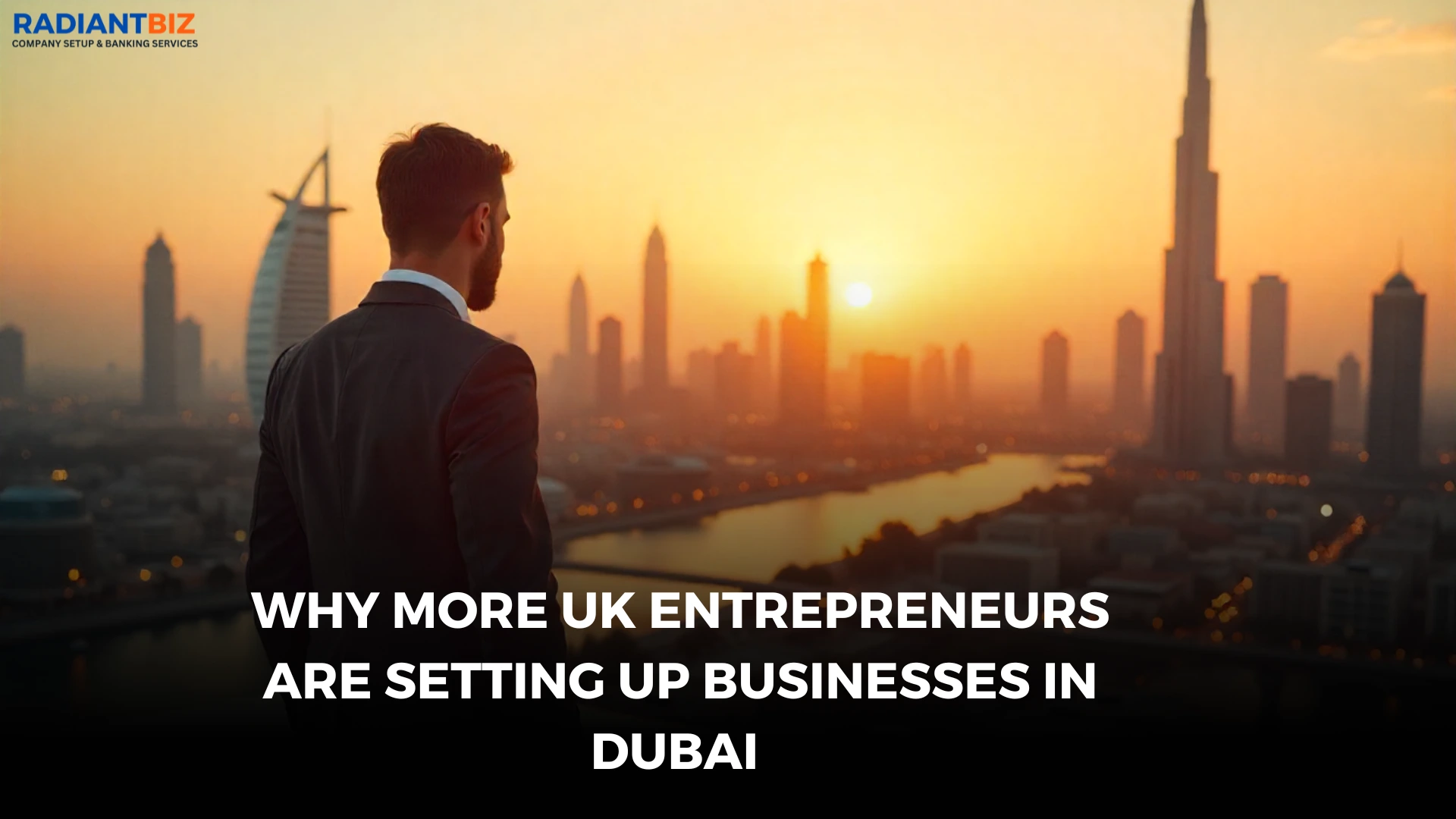Why More UK Entrepreneurs Are Setting Up Businesses in Dubai
A rising tide of British entrepreneurs is peering over the horizon from Britain and a lot of them are coming to Dubai. Previously associated primarily with skyscrapers and excess, Dubai has quickly evolved into one of the most desirable places in the world for business.
From no income tax to unprecedent access to developing markets, it presents UK founders with an opportunity to redefine growth in an environment geared for scale. In 2025, the number of British entrepreneurs establishing companies in Dubai is increasing substantially. Either because of the increasing cost of doing business in the UK, uncertainty around post-Brexit, or convenience in establishing operations in Dubai, migration of entrepreneurial skills is unequivocal.
A Strategic Gateway for Global Growth

Geographical location alone is a strong draw for Dubai. At the intersection of Europe, Asia, and Africa, it provides British companies with strategic proximity to more than 2 billion consumers within a four-hour flying radius.
For UK-based entrepreneurs, this provides a platform for expansion into the high-growth economies of the Middle East, Africa, and South Asia through Dubai as a base of operations. As service networks and supply chains more and more require global agility, having a base in Dubai enables UK startups to respond more quickly, reach more regions, and access customers in multiple time zones without the logistical nightmares of being exclusively based in Europe.
A Tax Environment for Entrepreneurs
One of the most persuasive business opportunities for British entrepreneurs is the very favourable tax system of Dubai. In contrast to the UK, where corporation tax, dividend tax, and income tax can severely devastate profits, Dubai has a pro-business tax system. No personal tax on income exists, and numerous organisations working in specified UAE free zones pay 0% corporate tax, as long as they satisfy local substance criteria.
UAE VAT is still at a low rate of 5%, and companies have complete repatriation of profit with no limits. For British entrepreneurs accustomed to greater expenses and more onerous compliance requirements back home, Dubai is an opportunity to unleash higher profitability and reinvest to grow without undue tax strain.
Full Foreign Ownership and Flexible Company Setup

As late as a few years back, foreign business owners in the UAE had to do business with a local Emirati sponsor in order to conduct mainland businesses. Now the UAE has radically overhauled its business regulations. Foreigners can now own their companies outright 100% in the majority of industries, whether on the mainland or in a free zone.
For British businesses, this implies they no longer need to settle on control or equity when expanding into the UAE market. They can incorporate a free zone company, open a branch, or create a holding structure based on their operating objectives. Additionally, licensing for business is quick, online, and in most cases, done within days.
Accessing High-Growth, High-Demand Sectors
Dubai is not just a money hub, it is an incubator for rapidly emerging industries. British entrepreneurs are creating opportunities in fintech, healthtech, logistics, e-commerce, sustainability, and education technology. UK professionals are also bringing their skills overseas in legal consulting, finance, creative services, and real estate.
The UAE’s Vision 2031 policy focuses on diversification and innovation, and this has provided the opportunity for UK companies to bring specialist solutions to a market eager for change. Dubai is no longer a buyer of talent in areas such as renewable energy, AI, and digital payments, today, it is building homegrown ecosystems, and British start-up founders are perfectly placed to make their mark.
Free Zones that Empower Startups
The free zone model of Dubai is a gold standard followed by foreign investors. These free zones are industry-specific and provide lots of benefits: 100% foreign ownership, no import/export tariffs, ease of visa services, office accommodation, and sector-specific financing in certain situations.
Favourite choices among UK business founders are the Dubai Multi Commodities Centre (DMCC) for trade and advisory firms, IFZA for low-cost, flexible startup licenses, DIFC for financial services and fintech companies, and Dubai South for logistics and aviation. Each of these serves a specific need, so that the entrepreneur can identify an ecosystem that meets their industry and size requirements.
Long-Term Visas and Talent Mobility
The other key reason why UK entrepreneurs are moving to Dubai is the ease of getting long-term visas. The UAE now has various residency options suitable for business owners, freelancers, and investors. Entrepreneurs may apply for investor visas tied to their license, or look for Golden Visas, which provide 5 to 10-year residency to eligible individuals.
This also applies to employees and family members. When it comes to importing talent from the UK or creating a local team, companies find it simpler to deal with visas and permits in Dubai compared to most Western nations. Remote work and digital nomad visas also complement startups with dispersed teams.
Fleeing Economic Pressures in the UK
UK entrepreneurs are experiencing increasing challenges: growing inflation, energy prices, higher corporate taxes, and more stringent post-Brexit regulations. Compliance costs are increasing, and state support for SMEs is wavering. For these reasons, a high number of small enterprise owners and start-ups are reconsidering their place of business.
Dubai, on the other hand, is opening red carpets to entrepreneurs. From business establishment assistance to fiscal rewards and intelligent regulation, the UAE’s pro-business policy has developed an environment that incentivises innovation. To numerous British founders, this atmosphere is not only attractive, it is vital.
A High-Quality Lifestyle That Supports Growth
Dubai offers much more than a financial opportunity, it provides an unmatched quality of life for entrepreneurs and their families. With year-round sunshine, world-class healthcare, top-tier international schools, modern infrastructure, and a safe urban environment, the lifestyle in Dubai is consistently ranked among the best globally.
The cost of living continues to be competitive relative to London or other UK cities when tax savings are included. Throw in the attractiveness of beach living, international cuisine, and international populace, and it is no wonder that so many British professionals are making the transition.
Access to Capital and Business Banking
Dubai is turning into a capital magnet. It is home to an increasingly active network of venture capital houses, angel investors, and family offices. The city’s financial industry is developing quickly. Fintech accelerators, startup pitch competitions, and grants simplify the process of raising funds for founders.
In parallel, Dubai’s banking system is well-integrated with global markets. Entrepreneurs can open corporate accounts, access trade finance, and conduct cross-border transactions with relative ease. British founders in fintech, SaaS, and e-commerce are finding increasing support from banks and investors alike.
Government Support and Reform-Driven Growth
The UAE government is one of the most reform-oriented governments in the world. Business processes are completely digitalised: license renewals, visa applications, tax returns, and trade licenses can all be done online. Initiatives such as Dubai SME, Dubai Next, and DED Trader License offer customised assistance to start-ups.
By eliminating bureaucratic hurdles and facilitating a paperless government, the UAE has established a streamlined environment wherein entrepreneurs can concentrate on building instead of dealing with red tape. For UK founders accustomed to the intricacies of HMRC, Companies House, and other UK regulatory agencies, the efficiency is a relief.
A Global Launchpad, Not Just a Local Market

Dubai is not the final game, it is the starting point. A great number of British business owners are employing the city as a springboard to expand across the MENA region, or as a location to develop franchise operations throughout emerging markets.
With its global legitimacy and web of trade agreements, the UAE provides simpler entry to countries throughout Asia, Africa, and the GCC.
UK startups can pilot products, check models, and then scale up. Be it a beauty company expanding to Saudi Arabia, a SaaS business entering India, or a consulting business expanding across Africa, Dubai makes it possible to scale up quicker without the usual impediments present in Western countries.
British Culture and Business Compatibility
Cultural affinity is a further driver of this trend. English is the language of commerce in Dubai, and British manners are widely understood in corporate and government sectors. Court documents, government websites, and consumer service platforms are all English-friendly, lowering barriers for UK entrepreneurs.
Toss into that the over 120,000 British nationals’ resident in the UAE, and you have a healthy peer ecosystem of entrepreneurs, investors, advisors, and mentors. Groups such as the British Business Group, UK-UAE Business Council, and private networking clubs facilitate seamless integration and success.
Operating a UK-UAE Dual Presence
Notably, most British founders are not closing down in the UK, they’re just growing. Proper structuring can let entrepreneurs keep a UK company and have a UAE entity running alongside it. Cross-border invoicing, tax efficiency, and simplified international mobility are possible.
Free zones, holding companies, and offshore arrangements can be deployed strategically to control IP, revenue streams, and investment between jurisdictions. Legal and financial planners in Dubai are familiar with dealing with UK-based clients and can facilitate dual-presence planning effectively.
Final Thoughts: Dubai is More Than a Trend, it is a Strategy
As 2025 gets under way, it is evident that Dubai is not only bringing UK entrepreneurs in but is also empowering them.
Whether your next step is founding your first startup or growing a second-stage company, the city has everything an entrepreneur might require: global connectivity, tax effectiveness, digital convenience, lifestyle, and a culture of drive.
For many UK entrepreneurs, especially those feeling squeezed by economic pressures back home, Dubai represents freedom, growth, and the chance to build globally in one of the world’s most future-forward markets.
If you’re considering where to take your business next, Dubai may be your most strategic move yet.
📌 Suggested FAQs
Q1. What are the main advantages of company formation in Dubai for UK entrepreneurs?
Dubai offers 100% foreign ownership, zero personal income tax, low corporate tax in free zones, strategic access to global markets, and simplified business setup procedures—all of which make it attractive for UK business owners.
Q2. Do UK entrepreneurs need a local partner to set up a company in Dubai?
No. Recent reforms allow 100% foreign ownership in most sectors, both in mainland and free zones. This means UK entrepreneurs can fully control their companies without needing an Emirati sponsor (except in restricted industries).
Q3. How much does it cost to set up a company in Dubai as a UK entrepreneur?
The cost depends on business activity, license type (mainland vs free zone), number of visas, and office requirements. On average, free zone company formation starts from AED 12,000–20,000, while mainland setup may vary depending on business scale.

